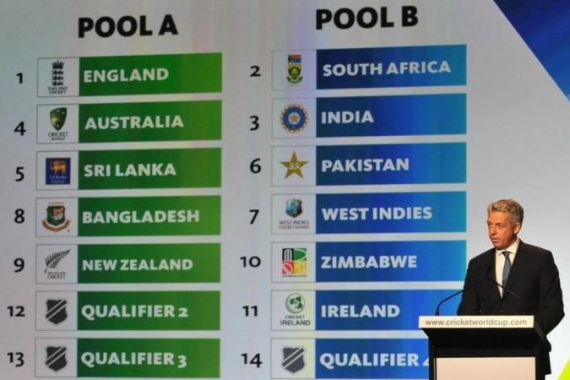ICC clampdown on corruption ahead of 2015
Chief exec of International Cricket Council has match-fixing on the mind ahead of 2015 World Cup in Australia and NZ.

The International Cricket Council (ICC) will strike agreements with law enforcement agencies in Australia and New Zealand to guard against corruption blighting the 2015 World Cup, chief executive David Richardson said on Tuesday.
Elite cricket has been rocked by a series of corruption-related scandals in recent years that have swept up players, umpires and officials around the world.
Keep reading
list of 4 itemsNew Zealand ease to seven-wicket win over Pakistan to level T20 series
Pakistan and New Zealand T20 abandoned due to rain after two balls
Australia’s Smith joins Washington Freedom before MLC cricket season
That's the real war, making sure that we know who thesepeople are, making sure that they stay away from the players,making sure that the players report in and protest as soon asthey happen
The 2015 World Cup, to be co-hosted by Australia and New Zealand, is likely to generate huge global betting interest, raising fears that players might be targeted by rogue bookmakers with the promise of big pay-offs for cheating.
ICC chief Richardson, a former South Africa wicketkeeper who played under disgraced captain Hansie Cronje, the game’s most infamous matchfixer, said the global governing body would work more closely with police in the co-host countries than in previous World Cups.
“Previously, we always had anti-corruption unit people there observing, educating and just keeping an eye on things,” the 53-year-old said at the launch of the 2015 World Cup in Melbourne on Tuesday.
“What’s different slightly for this event is that we’ll be entering into agreements with local police, law enforcement agencies to make sure they can help us in just, basically, building up the intelligence and making sure we can keep track on all the guys around the world who are trying to influence and may try to corrupt players getting involved.
“We find that there’s these unscrupulous individuals flying around the world betting on cricket, not obviously trying to fix every game but just betting on cricket.
“The temptation then is going to be there for them to get players to do what they shouldn’t.
“That’s the real war, making sure that we know who these people are, making sure that they stay away from the players, making sure that the players report in and protest as soon as they happen rather than being tempted to do anything stupid.”
Serious offence
Richardson’s comments come days after a British newspaper reported that the ICC’s Anti-Corruption and Security Unit (ACSU) would probe the recently-concluded one-day series between West Indies and Pakistan.
The Mail on Sunday alleged suspicious betting patterns and unusual passages of play.
The report followed revelations of matchfixing in the Bangladesh Premier League, with former Bangladesh captain Mohammad Ashraful confessing to cheating last month, and the arrests of three players in the lucrative Indian Premier League for cheating and fraud.
In keeping with the ICC’s silence on the work of the ACSU, Richardson declined to comment on the West Indies-Pakistan series or other allegations brought against players.
The other thing that we are quite keen is forcing through, or at least lobbying to get that legislation through which makes it a serious criminal offence to get involved in this kind of thing
Australia, where sports-related gambling has soared in recent years, was rocked earlier this year by a report from its top criminal intelligence agency that found organised crime was exerting a growing influence on local sports.
Richardson said the ICC would lobby governments in Australia and New Zealand to strengthen legislation to target sports-related corruption.
Australia has made concerted efforts to amend laws to target betting-related corruption in recent years but some states and territories lag behind others.
New Zealand currently has no legislation aimed specifically at matchfixing.
“The other thing that we are quite keen is forcing through, or at least lobbying to get that legislation through which makes it a serious criminal offence to get involved in this kind of thing, or even attempt to try to lure players or match officials into corrupt activities – in both countries,” Richardson said.
“I think it’s on the drawing board as I understand it, and we’re obviously keen that we get it through before the 2015 World Cup.”
Tournament organisers announced on Tuesday that New Zealand, Sri Lanka, Bangladesh and two qualifiers will join Australia and England in Pool A of the 14-team tournament.
South Africa, defending champions India, Pakistan, the West Indies, Zimbabwe, Ireland and a qualifier will compete in Pool B.
Australia and New Zealand will host 49 matches over 44 days during February and March 2015.
The 2015 Cricket World Cup final will be played as a day-night match at the Melbourne Cricket Ground, with the semifinals set for Sydney and Auckland, New Zealand.